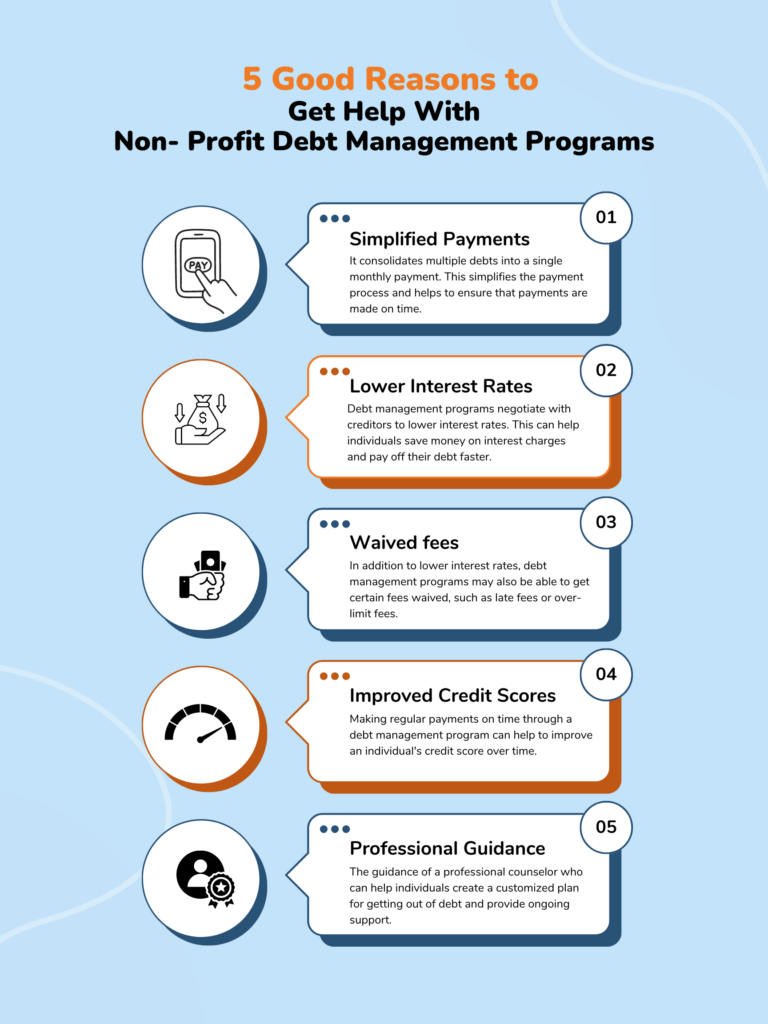Success Stories: Just How Debt Management Plan Services Transformed Financial Lives
Success Stories: Just How Debt Management Plan Services Transformed Financial Lives
Blog Article
Professional Tips and Techniques for Applying a Successful Financial Debt Administration Strategy
When it comes to navigating the complexities of debt management, having a well-thought-out plan is important for achieving economic stability. From evaluating your existing financial standing to bargaining with lenders, each action plays a crucial duty in shaping an effective debt monitoring strategy.
Evaluating Your Present Financial Scenario
Prior to getting started on a financial debt management plan, it is important to thoroughly assess your existing monetary standing. Understanding your financial situation is the fundamental step towards properly handling and reducing your financial obligation. Begin by putting together a detailed checklist of all your financial obligations, including superior equilibriums, rate of interest, and minimal monthly repayments. This will certainly offer a clear review of the degree of your monetary obligations. In addition, assess your earnings sources and regular monthly expenses to establish your disposable income readily available for financial debt payment.

Creating a Realistic Budget Plan
Recognizing your existing financial scenario lays the groundwork for developing a reasonable budget that aligns with your financial obligation management objectives and monetary capacities. When developing a budget, it's essential to precisely track your revenue, expenses, and financial obligation commitments. By categorizing your costs, you can identify locations where you may need to cut back to release up funds for financial obligation payment.

Prioritizing and Tackling Debts
To efficiently gain back control of your financial resources and job towards monetary security, prioritizing and tackling your financial debts is a crucial step in your financial debt administration strategy. Determine high-interest debts that are costing you the most cash and prioritize paying them off.
After identifying your high-interest financial debts, think about utilizing techniques like the financial obligation snowball or debt avalanche method to pay them off systematically. The debt snowball approach includes settling the tiniest financial debts first, while the debt avalanche technique focuses on financial obligations with the highest passion prices. Choose the method that lines up best with your monetary objectives and inspires you to keep making development.
Furthermore, think about working out with creditors for lower rates of interest or establishing up a layaway plan if you're having a hard time to meet your present commitments. Looking for support from a debt counselor or economic consultant can additionally supply useful understandings and support on how to effectively tackle your debts - debt management plan services. By focusing on and addressing your financial obligations tactically, you can lead the way in the direction of a debt-free future and improved financial well-being
Discussing With Creditors
When involving in debt monitoring, working out with lenders is a crucial action towards finding equally useful remedies for debt repayment. Open communication with financial institutions can result in modified layaway plan, reduced rate of interest, or even negotiation deals. Before launching settlements, it is vital to have a clear understanding of your financial scenario, including your earnings, costs, and the total quantity internet of financial debt owed. This info will certainly not only aid you make reasonable offers but likewise demonstrate to creditors that you are dedicated to solving the debt.

Building Healthy Economic Behaviors
Including consistent budgeting methods is essential for cultivating healthy and balanced economic routines. Budgeting allows people to track their income and expenses, allowing them to make enlightened choices concerning their financial top priorities. Establishing details monetary goals, such as saving for emergency situations or retired life, can supply a clear roadmap for handling money successfully.
One more secret element of building healthy financial habits is living within one's methods. This involves costs less than what is made and staying clear of unnecessary financial debt. Distinguishing and embracing a penny-wise way of thinking between demands and wants can aid people make more sensible spending choices.
On a regular basis checking and evaluating financial declarations credit history records are crucial habits that promote monetary understanding and responsibility. By remaining notified about their economic standing, people can identify possible issues Get More Info beforehand and take proactive actions to address them.
Additionally, establishing a financial savings habit, despite small amounts, can contribute substantially to lasting economic security. Saving regularly not only builds a financial pillow for unforeseen expenditures but also fosters a feeling of technique and obligation towards cash monitoring. By consistently exercising these habits, individuals can lay a solid structure for a stable economic future.
Final Thought
To conclude, executing an effective debt monitoring plan needs a complete assessment of one's economic circumstance, the development of a reasonable budget plan, prioritizing and taking on financial obligations, bargaining with creditors, and building healthy and balanced financial behaviors (debt management plan services). By complying with these professional ideas and approaches, individuals can take control of their financial resources and job towards attaining economic stability and liberty from financial obligation
Recognizing your existing economic circumstance lays the foundation for developing a sensible budget plan that aligns with your debt monitoring goals and monetary abilities.To properly regain control her comment is here of your financial resources and work towards economic security, focusing on and tackling your financial debts is a vital action in your debt administration plan.After identifying your high-interest debts, think about utilizing approaches like the debt snowball or debt avalanche approach to pay them off methodically. The financial obligation snowball approach entails paying off the tiniest financial debts initially, while the financial obligation avalanche technique prioritizes debts with the greatest interest prices.When involving in financial debt management, working out with financial institutions is an important step towards finding equally helpful remedies for financial obligation repayment.
Report this page